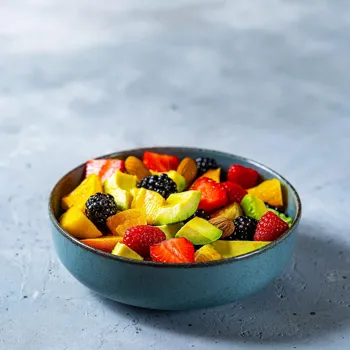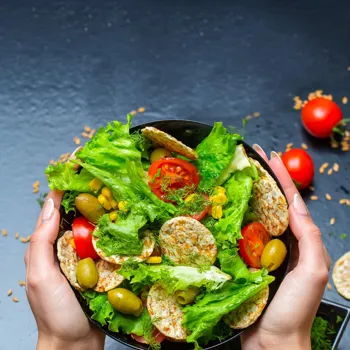7 Tips for Building a Healthy Relationship with Food, Boss! Dive in to nurture your mind & body with food harmony
Namaste, readers! Are you constantly stressing about what you eat? Feeling guilty after
that second roti? Relax, yaar! Building a healthy relationship with food is not about strict diets or complicated rules.

It's about finding a balance that nourishes your body and mind, allowing you to enjoy your meals without guilt or anxiety. It's about understanding your body's signals and honoring them. After all, food is fuel, celebration, and comfort, all rolled into one delicious package!
Let's ditch the food-related drama and discover some simple steps to make peace with your plate, shall we?
Ditch the Dieting Drama, Focus on Balance, Beta:
Stop jumping from one fad diet to another! These extreme restrictions often backfire, leading to cravings and feelings of deprivation. Instead, focus on creating a balanced plate with a variety of whole foods.
Think colorful vegetables, whole grains, lean proteins (like dals and paneer), and healthy fats (like nuts and ghee in moderation). A balanced diet should provide you with all the nutrients you need to thrive.
Paragraph 1: Dieting is a short-term fix, not a long-term solution.
When you deprive yourself, your body craves those restricted foods even more, often leading to overeating or bingeing. This can create a vicious cycle of dieting and failing, leaving you feeling frustrated and discouraged.
A balanced approach, on the other hand, promotes a sustainable and harmonious relationship with food. It's about nourishing your body, not punishing it. The goal is to find a way of eating that feels good, both physically and mentally, and that you can maintain for life.
Remember, food is not the enemy; restriction is.
Tune into Your Hunger and Fullness Cues, Yaar:
Our bodies are intelligent machines! They tell us when we're hungry and when we're full. The problem is, we often ignore these signals because of external factors like time of day, emotional state, or social pressure.

Before you reach for that samosa, ask yourself: Am I actually hungry, or am I just bored or stressed? Similarly, when you're eating, pause and check in with your body. Are you starting to feel satisfied? Stop eating when you're comfortably full, not stuffed like a Diwali ladoo!
Paragraph 2: Learning to trust your body's natural cues is key to building a healthy relationship with food. Pay attention to the subtle signs of hunger, such as a growling stomach or a feeling of emptiness. Don't wait until you're ravenous to eat, as this can lead to overeating.
Similarly, recognize the signs of fullness, such as a feeling of satisfaction or slight distension. It takes practice to tune into these cues, so be patient with yourself. One helpful tip is to eat slowly and mindfully, paying attention to the taste, texture, and aroma of your food.
This allows you to savor each bite and better gauge your hunger and fullness levels.
No Food is "Good" or "Bad," Only Nutritious or Less Nutritious, Understand?
Labeling foods as "good" or "bad" can create unnecessary guilt and anxiety around eating. It can also lead to restricting certain foods, which can backfire and increase cravings. Instead, think of foods on a spectrum of nutritious to less nutritious.
Broccoli and spinach are highly nutritious, packed with vitamins and minerals. Gulab jamun, on the other hand, is less nutritious but still enjoyable in moderation.
Paragraph 3: When you demonize certain foods, you create a sense of scarcity and make them even more desirable.
This can lead to overeating when you finally allow yourself to indulge. There's no need to completely restrict treats or "fun" foods; simply enjoy them in moderation. Allow yourself to have that piece of cake at a birthday party or that samosa at chai time, without feeling guilty.
The key is to focus on incorporating a variety of nutritious foods into your daily diet and to enjoy less nutritious foods in a balanced way. Remember, it's the overall pattern of your eating that matters, not one single food choice.
Practice Mindful Eating, Bhai:
Mindful eating is about paying attention to your food and the experience of eating without judgment. This means turning off the TV, putting away your phone, and focusing on the taste, texture, and aroma of each bite. Eat slowly, chew your food thoroughly, and savor the flavors.

Mindful eating can help you appreciate your food more, improve digestion, and become more aware of your hunger and fullness cues.
Paragraph 4: Mindful eating is about being fully present in the moment, without distractions or judgments.
It involves paying attention to all of your senses – sight, smell, taste, touch, and even sound – as you eat. As you chew your food, notice the textures, flavors, and aromas. Take small bites and savor each mouthful.
This allows you to fully appreciate your food and to connect with the experience of eating. Mindful eating can also help you slow down and become more aware of your hunger and fullness cues, which can prevent overeating.
It's a powerful tool for cultivating a healthier and more enjoyable relationship with food.
Don't Use Food as an Emotional Crutch, Chella:
Are you reaching for that ice cream every time you feel stressed, sad, or bored? Using food to cope with emotions can lead to unhealthy eating patterns and weight gain.
It's important to identify your emotional triggers and find alternative ways to manage your feelings, such as exercise, meditation, talking to a friend, or pursuing a hobby.
Paragraph 5: Emotional eating is a common coping mechanism, but it can be detrimental to your overall health and well-being.
When you use food to numb your emotions, you're not addressing the underlying issue. This can lead to a cycle of emotional eating, guilt, and shame. Learning to identify your emotional triggers and developing healthier coping strategies is crucial.
Try keeping a food journal to track your eating habits and identify patterns. When you feel the urge to eat emotionally, pause and ask yourself what you're really feeling. Then, try engaging in a healthy activity that you enjoy, such as going for a walk, reading a book, or listening to music.
Seek Professional Help If Needed, Guru:
If you're struggling with your relationship with food, don't hesitate to seek help from a registered dietitian or therapist. They can provide you with personalized guidance and support to overcome your challenges and develop a healthier and more positive relationship with food.
Paragraph 6: Sometimes, our relationship with food can become deeply ingrained and difficult to change on our own.
If you've tried various strategies and are still struggling with issues like emotional eating, restrictive dieting, or disordered eating patterns, seeking professional help can be incredibly beneficial.
A registered dietitian can help you develop a balanced and sustainable eating plan that meets your individual needs and preferences. A therapist can help you address the underlying emotional issues that may be contributing to your unhealthy relationship with food.
Remember, seeking help is a sign of strength, not weakness. With the right support, you can overcome your challenges and build a healthier and more fulfilling relationship with food.
Be Patient and Kind to Yourself, Dost!
Building a healthy relationship with food is a journey, not a destination. There will be ups and downs along the way. Don't beat yourself up if you slip up or make a mistake. Just learn from it and keep moving forward. Be patient with yourself and celebrate your progress, no matter how small.
Remember, you're doing your best, and that's all that matters! Change does not happen overnight. There may be times when you find yourself reverting to old habits or feeling discouraged. This is normal! The key is to not give up on yourself.
Be compassionate and forgiving, and remind yourself that it's okay to make mistakes. The important thing is to learn from those mistakes and to continue striving towards your goals. Celebrate your successes, no matter how small they may seem.
Each step you take towards a healthier relationship with food is a victory! Treat yourself with kindness and understanding, and you'll be well on your way to developing a lifelong, positive relationship with food.












